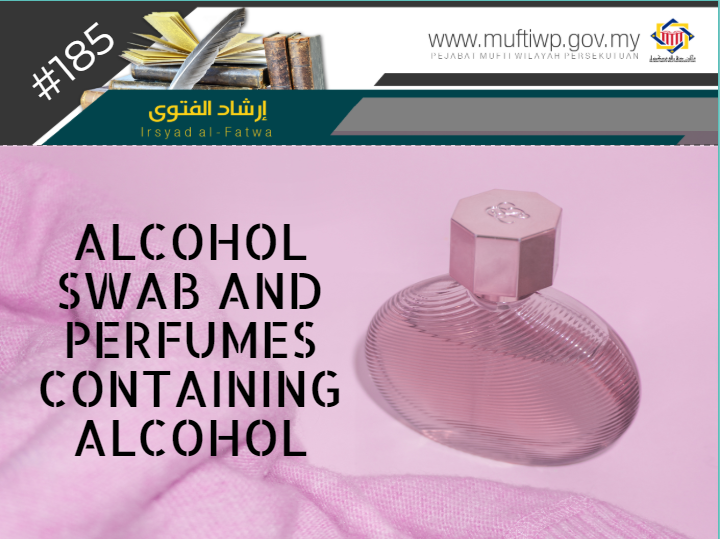Question:
Is the alcohol in perfumes considered as najis and cannot be brought in prayer? How about patients that use alcohol swab for medical treatment or cupping?
Answer:
Alhamdulillah, praise and thanks to Allah for the countless blessings He has blessed us all with. Blessings and salutations to the Prophet Muhammad PBUH, his wives, his family, companions and all those that follow his teachings to the day of judgement.
According to the 4th edition of Kamus Dewan, alcohol is defined as: “1. Flammable liquid and an intoxicant (found in alcoholic beverages); 2. Alcoholic beverages, contains alcohol: do not drink this beverage ~ or carbonated; avoid treating wounds or scratches with this mixture ~.”
Islamic scholars have two opinions regarding this issue:
- The Opinion of Jumhur (the Majority of the Jurists)
The scholars from mazhab Syafie view alcohol as najis (impure), for it is included as intoxicating substance. This is stated in Fiqh al-Manhaji (1/183-184):
“First: Alcoholic beverage and any intoxicating substance. This is in accordance with a statement of Allah SWT:
يَا أَيُّهَا الَّذِينَ آمَنُوا إِنَّمَا الْخَمْرُ وَالْمَيْسِرُ وَالْأَنصَابُ وَالْأَزْلَامُ رِجْسٌ مِّنْ عَمَلِ الشَّيْطَانِ فَاجْتَنِبُوهُ لَعَلَّكُمْ تُفْلِحُونَ
O you who have believed, indeed, intoxicants, gambling, [sacrificing on] stone alters [to other than Allah], and divining arrows are but defilement from the work of Satan, so avoid it that you may be successful.
Surah al-Maidah (90)
Defilement in this verse means najis. From Ibn Umar RA, the Prophet PBUH said:
كُلَّ مُسْكِرٍ خَمْرٌ وَأَنَّ كُلَّ خَمْرٍ حَرَامٌ
"Every intoxicant is Khamr, and every intoxicant is prohibited."
Sahih Muslim (2003)
This is the final opinion in mazhab Maliki, Hanafi and Hanbali. Refer al-Mausu`ah al-Fiqhiyyah al-Kuwaitiyyah (40/93-94).
- The Minority Opinion
In their opinion, it is prohibited to drink alcoholic beverages but the alcoholic beverage itself is not najis. They refer to the action of the companions of the Prophet PBUH that spill and break the containers of alcoholic beverages when it is declared prohibited, and the beverages flow on the roads of Medina (Refer to Sahih al-Bukhari no. 2464). If it is najis, then surely the companions wouldn’t do such a thing for there is a prohibition of throwing najis and urinate in the streets. They respond to the istidlal for the impurity (najis) of alcoholic beverages according to verse 90 surah al-Maidah, saying that it refers to the hukmiyyah or maknawi (in term of meaning) and not to its essence or ain. In other words, arrows used for foretelling, idols made from dirt and tools used for gambling are not physically considered as najis. Maknawi najis is stated in the Quran:
إِنَّمَا الْمُشْرِكُونَ نَجَسٌ
“Indeed, the polytheists are unclean,”
Surah al-Taubah (28)
Here, the unclean (نَجَسٌ) refers to their belief and not their physical body. Thus, the term rijs in this verse is not qat’I (definite).
This is the opinion of Rabi`ah Syeikh to Imam Malik, al-Laith bin Saad, al-Muzani a friend and student of Imam al-Syafie and contemporary scholars, such as al-Syaukani in Nail al-Autar, al-San’ani and Syeikh Muhammad Rashid Ridha, and Syeikh Atiyyah Saqr.
Refer Fatawa Atiyyah Saqr (1/78); al-Mausu`ah al-Fiqhiyyah al-Kuwaitiyyah (40/93-94).
This is also the opinion of Syeikh Dr Yusuf al-Qaradhawi in Fatawa al-Mu’asirah.
The Fatwa of Brunei Government's Mufti Year 2005 (p. 74) also states: "It is prohibited to drink synthetic alcohols made from a mixture of chemicals because of its harmful and poisonous nature. As for cosmetics that contain alcohol produced synthetically or artificially from chemical mixtures, it is permissible, as it is not considered as najis. Furthermore, the prayer of someone that wears clothing that has been sprayed with the perfume that contains alcohol produced synthetically or artificial alcohol produced from chemical mixtures is valid for it is not considered as najis."
Similarly, the 7th Muzakarah of the Fatwa Committee of National Council for Islamic Religious Affairs Malaysia met on 11th -12th April 1984 discussed Alcohol According to Islamic View. The Muzakarah has decided that:
- All alcoholic beverage contains alcohol. Not all alcohol is considered as an intoxicant and prohibited. Alcohol from the process of wine-making (or other processes of making alcoholic beverages) is prohibited and impure (najis), but other alcohols made from processes other than for alcoholic beverages processes is not impure (najis), but is prohibited to be consumed.
- Soft drinks made the same way as any liquor, whether it contains a little alcohol or if its alcohol content is distilled is prohibited to be consumed.
- Soft drinks made not into liquor or intoxicating substances and not the same as the wine process is halal and permissible.
- Tapai is halal and permissible to be eaten.
- Alcohol produced as a by-product of the process of making food is not najis (impure) and edible (permissible to be eaten).
- Medicines and fragrances that contain alcohol content are permissible.
Conclusion
In our opinion, it is best if we avoid using alcohol in our daily lives, to stay away from the khilaf of the scholars. We should avoid syubhah matters, especially when we are uncertain as to the source of the alcohol used in perfumes, whether they are from the process of making alcoholic beverages or not. The Prophet PBUH said:
دَعْ مَا يَرِيبُكَ إِلَى مَا لَا يَرِيبُكَ
“Leave that which makes you doubt for that which does not make you doubt.”
Sunan al-Tarmizi (2442)
Thus, we should choose other alternatives that its purity and permissibility is certain. However, if there is a necessity, then the guidelines set in Muzakarah of the Fatwa Committee of National Council for Islamic Religious Affairs Malaysia stated above can be followed. May Allah SWT bless our lives.


